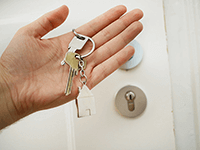
If you are struggling to save up a large deposit to buy a house, a 5% deposit mortgage might be an attractive option for you.
In this blog, we will look into 5% deposit mortgages, their advantages and drawbacks, and how you can get one.
What is a 5% deposit mortgage?
It is a type of mortgage where you only have to put down 5% of the property’s value as a deposit.
This type of mortgage is commonly referred to as a 95% loan-to-value (LTV) mortgage, which indicates that 95% of the property’s value has been borrowed.
It might be an attractive option for first-time buyers who may be struggling to save up a large deposit for their property purchase.
It’s important to remember, as with any mortgage, that you still need to meet other criteria to be accepted for a 95% LTV mortgage. Factors including your income and credit score will all be considered by your lender, so having a 5% deposit saved may not be enough to guarantee you can buy the property.
What are the benefits of a 5% deposit mortgage?
The obvious benefits of a 5% deposit mortgage is that you don’t need to save up as much of a deposit. The average deposit required to buy a house in the UK is around 15%, which may take a long time to save up. A 95% LTV mortgage can be really helpful for people, especially young first-time buyers, who want to buy a house quickly or are struggling to save up a larger deposit.
Once you have bought your house, you have taken your first steps to get on the property ladder. Property can be a worthwhile investment because there is the potential for capital growth. If you invest in a property, there is a good chance that it will be worth more in the future, providing you with a profitable asset if you choose to sell.
What are the negatives of a 5% deposit mortgage?
Often, with 95% LTV mortgages, the lenders may increase interest rates to offset the risk associated with lending a larger sum of money. This might mean higher monthly payments and the potential to pay more over the lifetime of the mortgage.
Also, due to the higher risk to the lender, they can have more complicated qualifying criteria. This could mean you need to have a very good credit score, or proof of a stable income. This could make it more difficult if you have a history of poor credit or are self-employed.
To add to this, if the property’s value declines, you may find yourself in negative equity. This means that the property is worth less than the outstanding mortgage balance, which can make it more difficult if you decide to sell the property or try to remortgage.
How to get a 5% deposit mortgage?
Applying for a 5% deposit mortgage is similar to applying for any mortgage. There are certain steps you will have to take which include:
- Save for your deposit: When you are looking to get any kind of mortgage, you will usually need a deposit. When you have an idea of your budget, you can assess your savings to see if you have 5% of the property’s price. If you don’t you’ll need to continue saving. You can work on saving your money by following our ‘top ten tips to save money.’
- Check your credit score: Before applying for a mortgage you should always check your credit score and take steps to improve it. Having a higher credit score will help you increase your chances of being accepted. You can improve your credit rating by making sure you’re registered to vote, and by keeping on top of regular payments. For more information on credit scores and how to improve them, read our blog; ‘credit history’.
- Do your research: Familiarise yourself with the property market in the area you’d like to buy. This can help you make informed decisions and negotiate a fairer price.
You could also seek professional advice from a mortgage broker or financial advisor if you need help.
Summary
5% deposit mortgages can be very helpful to those who are struggling to save up a large deposit to buy a house, especially first-time buyers. However, there are some drawbacks to this type of mortgage, such as higher interest rates and more strict qualifying criteria. The application process is largely similar to that of a regular mortgage, once you are aware of the qualifying criteria and the possible benefits and drawbacks, you can start applying if it is the right fit for you.
Think carefully before securing other debts against your home. Your home may be repossessed if you do not keep up repayments on a mortgage or any other debt secured on it.




